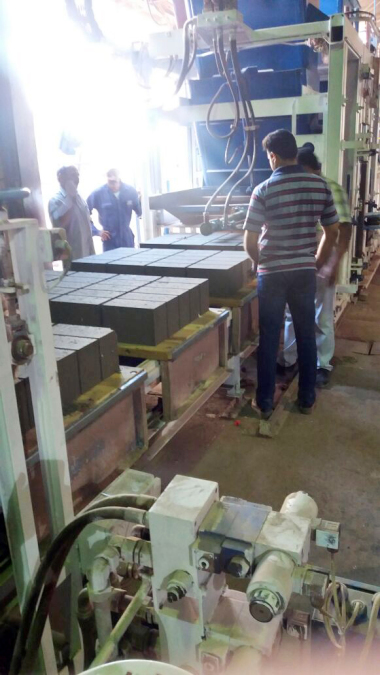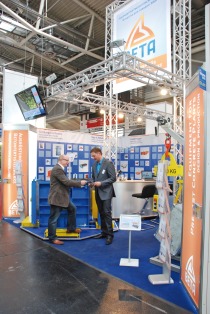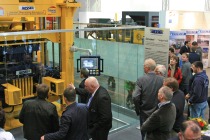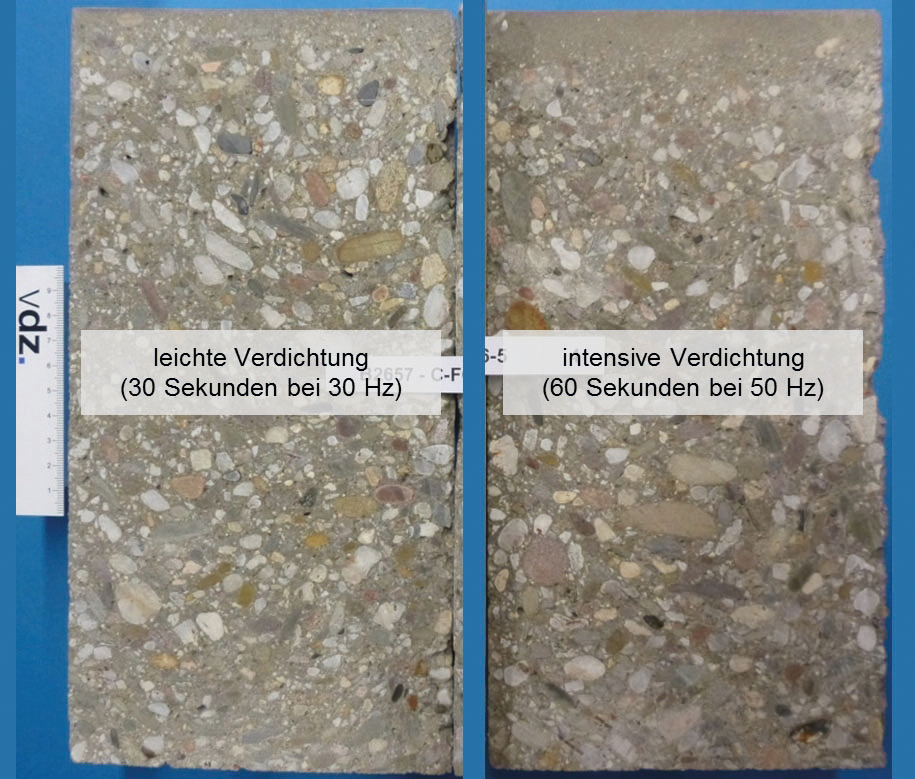Production of reinforced slabs on a 1,400 x 1,100 mm vibrating press
Located in Conegliano, about 50 km north of Treviso in Italy, Sarom S.p.A. has focused its business on two production areas. About 80% of all elements are manufactured for Trenitalia, the Italian railway company. In addition, Sarom produces concrete chimneys and grills. Last year, a completely new system was commissioned to manufacture cover slabs for smaller manholes for Trenitalia: The reinforced slabs come in sizes of up to 50 x 50 cm; they are produced on a block machine with harmonic vibration. A particular challenge posed by the design of this block machine was the integration of an automated unit to insert mesh reinforcement. Weiss Impianti S.r.l. conceived a complete solution enabling Sarom to produce 800 to 2,000 slabs per hour, depending on their dimensions.
The Sarom S.p.A. site covers an area of approx. 120,000 m2. The facility comprises five fully equipped, autonomous factory buildings accommodating a total of nine production lines. The associated storage areas were designed to ensure a perfectly adjusted logistics system. Roofed areas make it possible to store products even during bad weather periods without any adverse effect on quality.
The company is owned by the Moras family, who have always applied one key principle: to ensure a particularly high quality standard. This quality is achieved by applying a diverse range of measures and guidelines. State-of-the-art production technologies, an internal laboratory for materials testing, the close cooperation with private and state-owned testing institutions and the use of a select range of tested raw materials all contribute to ensuring this quality whilst enabling continuous product improvement. The management also places special emphasis on environmental protection, for example by using environmentally friendly packaging materials easy to dispose of.
In addition, the business has been ISO 9001 certified. As a result, its internal organizational structure, workflows and processes conform to a high standard. The additional certification to UNI EN ISO 14001 confirms that the environmental management activities pursued by Sarom S.p.A. comply with international laws and regulations. This certificate proves that the company incorporates environmental aspects in all of its activities whilst carrying out research and development to design new materials and processes.
About 80% of all products manufactured by the precaster are supplied to Trenitalia, the Italian railway operator. Sarom produces cable ducts in most diverse dimensions, including their covers, as well as various housings and containers and a large number of custom elements, such as boundary stones or foundations for reflector posts. Due to their largely standardized dimensions, the products can be manufactured and stored on a continuous basis.
Rationale for investment/underlying conditions
Due to a continuous increase in demand, and to improve the quality of its products, Sarom decided, in 2007, to invest in a new line to produce small-scale reinforced manhole covers. These slabs are produced in dimensions of 50 x 50 cm and 40 x 60 cm, in a thickness of only 5 cm. Prior to the installation of the new line, these products were manufactured manually in small steel molds. The concrete was then compacted by external vibrators. As part of the considerations regarding a new production line, the idea was conceived to use a block machine for the production of the slabs, i.e. to use no-slump concrete and a vibrating press for compaction purposes. A particular issue to be resolved in this respect was the development of a solution to insert reinforcement because the slabs had to be fitted with crosswise reinforcement due to the high traffic loads acting on them. Sarom S.p.A. decided to award the contract for the new production line to Weiss Impianti S.r.l. The members of the management were convinced that the system of harmonic vibration used in the block machine was the compaction method best-suited to the elements to be manufactured. In addition, the Italian engineering company conceived a compelling solution to integrate an automated unit for reinforcement insertion.
Another challenge was to integrate the new line in an existing factory building. Beyond the available footprint, the low height of this building was another limiting factor.
The WEISS Silentium ARV1 – 2000 block machine with harmonic vibration
Silentium is the name of the machine offered by Weiss Impianti S.r.l. in which harmonic vibration is used for compaction. Business owner Federico Weiss purchased the patent for the integration of this compaction design from IFF Weimar e.V. The machine can be used to manufacture paving stones, curbs, hollow blocks, chimney blocks and other concrete products. Depending on the model, board sizes extend to a maximum of 1,400 x 1,400 mm while product heights range from 40 to 1,000 mm. The maximum table vibration force amounts to 800 kN. 160 to 280 cycles per hour can be performed. No knocking bars are used when applying harmonic vibration. In harmonic vibration, the acceleration peaks usually achieved by hard and loud knocks are realized by correspondingly higher forces. In this process, vibration is generated by eight large vibrating masses. Weiss Impianti developed a new vibration table with a total force measured at up to 800 kN while conventional systems reach only about 180 kN. This table provides the advantage of being continuously adjustable while the mold is filled uniformly across the entire area. In addition, the noise level generated in production is significantly reduced. Wear and tear of base plates and other parts is lower, as is the impact on the molds used. The products manufactured on the line show a particularly homogeneous structure, perfect surfaces and a constant bulk density. The excellent level of compaction also results in a lower degree of water absorption. Even 100-cm high elements still show perfect surface finishes due to the outstanding concrete compaction achieved by harmonic vibration.
Production of slabs at Sarom S.p.A.
Due to the limited space available at Sarom, a circulation system was designed that requires only very little footprint. Due to the low height of the building, even a section of the roof had to be extended to accommodate the elevator/lowerator unit.
The manhole cover slabs are produced in various sizes (e.g. 50 x 50 – 20 x 50 – 40 x 40 cm), in a thickness of only 4 to 5 cm. Since the slabs need to be reinforced, the production process includes two steps. Following the placement of a first concrete layer and a brief pre-compaction period, tamper and load are lifted. In the next step, a specially designed system feeds the individual pieces of reinforcement and conveys them into the mold chambers. Once the reinforcement has been inserted, the second concrete layer is placed and the vibration process resumed. Sarom has contracted a steel trading business to cut the reinforcing elements to size and to deliver them to the site so that appropriate sections of mesh reinforcement are available for production.
A bucket conveyor transports the no-slump concrete from the neighboring building to the production line. Cycles times required for production range from 16 to 22 seconds. The green slabs are then stored in the curing chambers using an elevator and car system. The design of the elevator/lowerator system exceeded the height of the factory building so that the roof was modified and elevated in this section.
The curing chamber provides space for 4,500 base plates, which are usually stored in the chamber for about 24 hours. The chambers are not self-contained and are not heated. Following completion of the curing process, the slabs are turned by 180°, i.e. into their final laying position, by a device specifically developed by Weiss Impianti. For this purpose, a second base plate is placed onto the layer of slabs, which is then turned. Once the slab packages have passed through the extremely robust base plate lifting and palletizing units, they are strapped both horizontally and vertically.
Conclusion
By using a block machine to produce the cover slabs, Sarom S.p.A. could increase its productivity significantly. These elements can now be manufactured in an almost fully automated way. As a result of the close collaboration with Weiss Impianti, various custom-made solutions could be conceived, in particular with regard to reinforcement insertion.
For reinforcement insertion in particular, numerous production parameters had to be considered. Not only is there a need to adhere to the exact positioning in relation to the edge distances – the concrete cover required on top of the reinforcement must also be ensured. It was thus of crucial importance to also achieve an accurate adjustment of the mold filling process.
The concrete products enormously benefited from the use of harmonic vibration for compaction purposes. This is the only method to ensure the high quality of both compaction and surface finish of these relatively thin slabs.




